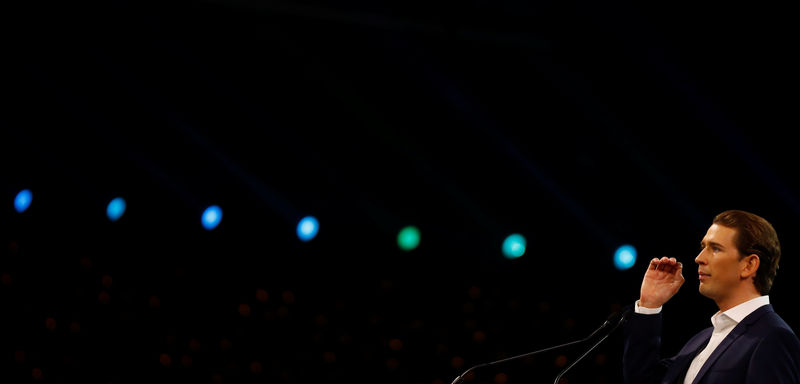By Francois Murphy
VIENNA (Reuters) - Conservative Sebastian Kurz will become one of the world's youngest leaders if he becomes Austrian chancellor after parliamentary elections on Sunday.
His Austrian People's Party (OVP) has been in power, always as part of a coalition, since he was five months old.
But the 31-year-old foreign minister has convinced many voters that he will bring something new to an old party even though his views beyond the central campaign issue of immigration are largely in line with the old OVP.
The keen windsurfer and hiker has rebranded the party as the "New People's Party" and changed its colour from black to turquoise and drawn in candidates from outside the OVP ranks.
The party's posters carry urgent slogans like "Now or never" and "This time, Kurz". Polls show his party clearly in the lead with about a third of the vote, with the FPO and Social Democrats neck and neck.
"The OVP has been in government for more than 30 years running and its posters say 'Time for something new'. It's a massive contradiction but with Kurz it works," political analyst Thomas Hofer said.
"Many people project what they want to see onto him and he's trying not to damage that."
Kurz frequently reminds voters that he opposed opening the borders in 2015 during Europe's migration crisis. He also wants to restrict benefits for refugees and other new arrivals.
As foreign minister also in charge of integration in a coalition government with the Social Democrats, he has a wide mandate, but taking a hard line on immigration and avoiding another influx like 2015's has dominated his discourse.
"Above all, we want to stop illegal immigration so there is order and security in our country," Kurz told his last campaign rally on Saturday in the southern city of Graz, even though illegal immigration is a fraction of what it was two years ago.
"We want there to be a new fairness in our country, for social safety nets to be there for those who really need help but for immigration into our social security system to stop, to protect our social security system."
The migration crisis played into the hands of the far-right Freedom Party. After Austria took in more than 1 percent of its population in asylum seekers in 2015, heightening many voters' concerns about jobs and security, support for the FPO grew. Its candidate came close to winning last year's presidential runoff.
But when the OVP picked Kurz as its new leader in May, that catapulted the party to first place in the polls from third, dislodging the Freedom Party (FPO) led by Heinz-Christian Strache from a top spot it had held for more than a year.
"He says a lot of similar things to Strache and the FPO but in a more socially acceptable way," Hofer said of Kurz.
"SOMETHING NEW"
As foreign minister he helped broker border restrictions through the Balkans last year that largely shut what was then the main migrant route into Europe, and Kurz likes stick to the subject of immigration.
"It's really remarkable. On every issue you manage to change the subject immediately to refugees and political Islam," Greens leader Ulrike Lunacek said in a head-to-head debate with Kurz last month, during a segment on women's issues.
Beyond immigration, his youth means he has a limited track record in policy making, giving him an elusive quality.
But he supports the classically conservative positions such as lowering taxes for companies and opposing gay marriage. [
His opponents try to remind voters that he represents one of the two parties that have dominated Austrian post-war politics.
In an FPO video a young man asks a tattoo parlour to etch Kurz on his back. He is horrified to find a picture of Kurz plus grey-haired OVP veterans.
"I wanted Kurz, not the OVP!" he screams. The tattoo artist replies: "What did you expect? Kurz is the OVP!"
But that is not what many voters see in a country that is frustrated by the deadlock and compromises of centrist coalitions like the current one between the OVP and Social Democrats, who have ruled together for 44 of the past 72 years.
"People are unhappy with the old OVP but not with the new OVP under Sebastian Kurz," pollster Peter Hajek said.
"Voters are basing their judgment largely on people, partly because ideological structures are crumbling. Kurz has managed to distance himself from this government and say, 'I'm offering you something new'."
If his party wins the election, Kurz will most likely need to ally with either the FPO or the Social Democrats, whose leader he is at loggerheads with, to govern.
This may limit what he can achieve although his supporters at the Graz rally were optimistic.
"He has the most potential to change something," said 16-year-old voter Jessica Kriftner.

"Everyone my age is for him."